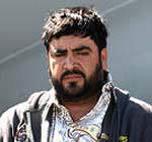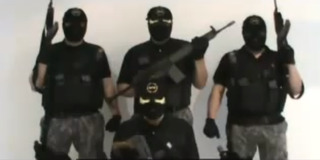The Fuerza Especial Conjunta (Joint Special Operations Command) or FEC, previously known as Fuerza Especial de Reaccion (FER) or Fuerza Especial del Alto Mando (FEAM) (High Command Special Force) is a special unit of SEDENA, under operational control of the Joint National Defense Staff (Estado Mayor Conjunto de la Defensa Nacional). The unit's missions primarily involve counterterrorism, hostage rescue, direct action, and special reconnaissance against high-value targets.

Joaquín Archivaldo Guzmán Loera, commonly known as "El Chapo" and "JGL", is a Mexican former drug lord and a former leader within the Sinaloa Cartel, an international crime syndicate. He is considered to have been one of the most powerful drug traffickers in the world.
Operation Tijuana or Operation Baja California of the Government of Mexico is taking place in Tijuana and the surrounding areas of Baja California and Baja California Sur. This operation is part of the Joint Operation Against Drug Trafficking.
Los Negros was a criminal organization that was once the armed wing of the Sinaloa Cartel and after a switch of alliances, became the armed wing of the Sinaloa splinter gang, the Beltrán-Leyva Cartel. In 2010 it went independent and had been contesting the control of the Beltrán-Leyva Cartel. It was then the criminal paramilitary unit of Édgar Valdez Villarreal in Mexico. Valdez was arrested on August 30, 2010, near Mexico City. Los Negros was led by Valdez at the time they merged with the Sinaloa Cartel.

Ignacio "Nacho" Coronel Villarreal was a Mexican suspected drug lord and a founder of the Sinaloa Cartel, a criminal group based in Sinaloa. He worked alongside Joaquín "El Chapo" Guzmán, Mexico's most-wanted drug lord. His stronghold was Jalisco.
The timeline of some of the most relevant events in the Mexican drug war is set out below. Although violence between drug cartels had been occurring for three decades, the Mexican government held a generally passive stance regarding cartel violence through the 1980s and early 2000s.

Jorge Eduardo Costilla Sánchez is a former Mexican drug lord and top leader of the criminal drug trafficking organization known as the Gulf Cartel. He was among Mexico's most-wanted drug lords, until his arrest in 2012.

Heriberto Lazcano Lazcano, commonly referred to by his aliases Z-3 and El Lazca, was a Mexican drug lord and the leader of Los Zetas drug cartel. He was one of the most-wanted Mexican drug lords.

Joint Operation Nuevo León-Tamaulipas is an anti-drug joint operation in two Mexican states of Tamaulipas and Nuevo León by Federal Police and the Mexican Armed Forces. The objective of the joint operation is to eliminate Los Zetas and Gulf Cartel operations in the area. So far, many cartel members have been either killed or arrested. Recently Los Zetas and the Gulf Cartel have broken relations and started fighting each other.
The Beltrán Leyva Organization (BLO), also known as the Beltrán Leyva Cartel; Spanish: Cártel de los Beltrán Leyva (CBL), was a Mexican drug cartel and organized crime syndicate, formerly headed by the five Beltrán Leyva brothers: Marcos Arturo, Carlos, Alfredo, Mario Alberto, and Héctor. Founded as a Sinaloa Cartel, the Beltrán Leyva cartel was responsible for transportation and wholesaling of cocaine, heroin and marijuana. It controlled numerous drug trafficking corridors, and engaged in human smuggling, money laundering, extortion, kidnapping, murder and gun-running.
Marcos Arturo Beltrán Leyva was a Mexican drug lord who, alongside his brothers, founded and led the Beltrán-Leyva Cartel. Prior to founding his own organization, Beltran-Leyva was a longtime high-ranking member of the Sinaloa Cartel. His organization was responsible for cocaine, marijuana, heroin and methamphetamine production, transportation and wholesaling. It controlled numerous drug trafficking corridors into the United States and was responsible for money laundering, gun-running, and other acts of violence against men, women, and children in Mexico. The organization was connected with the assassinations of numerous Mexican law enforcement officials.
Héctor Manuel Beltrán Leyva was a Mexican drug lord and leader of the Beltrán Leyva Cartel, a drug-trafficking organization. He was the brother of Arturo Beltrán Leyva (deceased), former leader of the cartel. Héctor was the second-in-command and rose to the leadership of the criminal organization after his brother's death on 16 December 2009 during a confrontation with Mexican marines.
Operation Sinaloa or Operation Culiacan - Navolato is an ongoing anti-drug trafficking operation in the Mexican state of Sinaloa by the Federal Police and the Mexican Armed Forces. Its main objective is to cripple all cartel organizations such as the Sinaloa Cartel, Beltrán-Leyva Cartel and Los Zetas that operate in that state. The Military was deployed in response to the murder of Mexico's Federal Police commissioner Édgar Eusebio Millán Gómez.

Alfredo Beltrán Leyva, commonly referred to by his alias El Mochomo, is a Mexican convicted drug lord and former leader of the Beltrán-Leyva Cartel, a drug trafficking organization. He was one of Mexico's most-wanted drug lords. Beltrán Leyva was responsible for smuggling multi-ton shipments of cocaine and methamphetamine to the United States from Mexico and South America between the 1990s and 2000s. He worked alongside his brothers Héctor, Carlos, and Arturo.
This is a list of Mexico's 37 most-wanted drug lords as published by Mexican federal authorities on 23 March 2009. According to a BBC Mundo Mexico report, the 37 drug lords "have jeopardized Mexico national security."

Cárteles Unidos, also known as La Resistencia is a Mexican criminal enforcer squad composed of well-trained gunmen from the Sinaloa Cartel, Gulf Cartel, La Familia Michoacana, and Knights Templar Cartel originally formed to expel the Los Zetas Cartel from the states of Michoacán and Jalisco. However, Cárteles Unidos' current main rival has now become the Jalisco New Generation Cartel; a paramilitary criminal organization based in the neighboring state of Jalisco.

Los Ántrax is a large enforcer unit and hit squad for the Sinaloa Cartel, a major crime syndicate based in the Mexican state of Sinaloa. The group was led by the drug lords Jesús Peña, José Rodrigo Aréchiga Gamboa, René Velázquez Valenzuela, among others, and they are responsible for a number of homicides and for providing armed security services to Ismael El Mayo Zambada. The gang operates in the capital city of Culiacán, Sinaloa, where its members conduct homicides and violent attacks. Los Antrax is the Sinaloa Cartel's largest and deadliest enforcer unit.
Gonzalo Inzunza Inzunza, commonly referred to by his alias El Macho Prieto, was a Mexican suspected drug lord and high-ranking leader of the Sinaloa Cartel, a criminal group based in Sinaloa, Mexico. He worked as the cartel's assassins chief under the tutelage of Ismael "El Mayo" Zambada and as the regional leader of the cartel in the states of Baja California and Sonora. His base of operations was in Mexicali, where he coordinated marijuana and cocaine shipments through the Calexico–Mexicali border region. On 18 December 2013, Inzunza was killed in a shootout with Mexican authorities in the resort area of Puerto Peñasco, Sonora. Before the gunfight was over, several of his gunmen took the corpse of the drug lord with them.

Fausto Isidro Meza Flores alias "El Chapo Isidro", is a Mexican drug lord and leader of Los Mazatlecos. He has a high-ranking in the Beltrán Leyva Cartel and was the right-hand man of Alfredo Beltrán Leyva before he got incarcerated in United States.
Operation Mongoose Azteca is the code name for a joint operation carried out by US and Mexican intelligence and military forces to detect the criminal activities of the Sinaloa Cartel and which led to the capture of the son of Joaquín "El Chapo" Guzmán, Ovidio Guzmán López, aka "El Ratón". After this successful operation, several municipalities including the capital of the state of Sinaloa, Culiacán, were the target of road blockades, gun fights and several other riots, orchestrated by militant forces of the Sinaloa Cartel. After constant tracking and joint intelligence activities between the United States and Mexico, a Sinaloa Cartel convoy was located in the town of Jesus María, where Ovidio Guzmán was recaptured.











